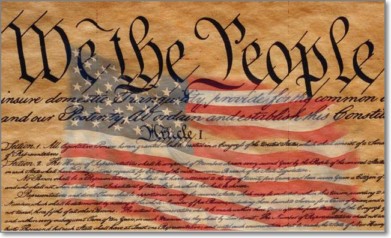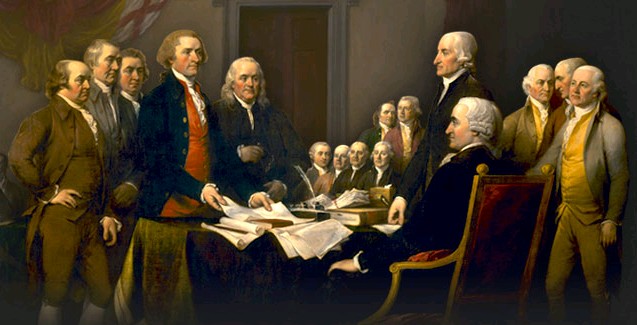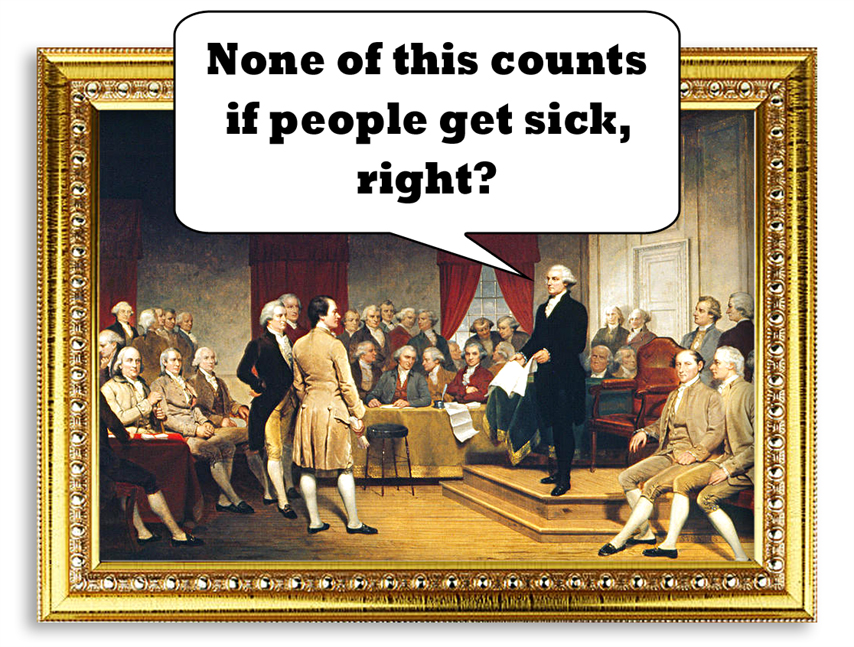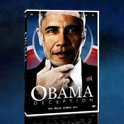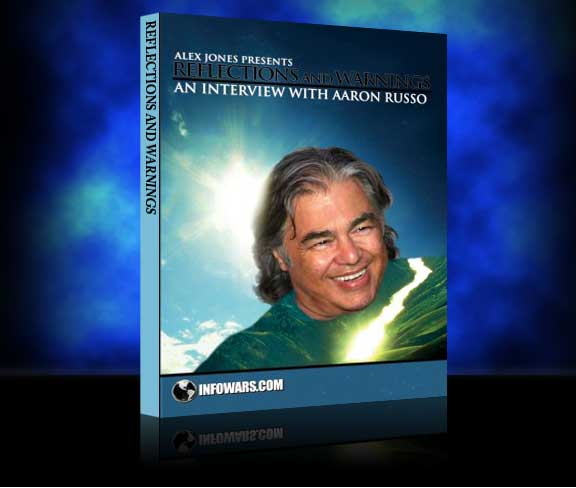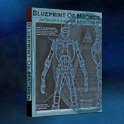welcome
|
|||||||||||||||||
THE CONSTITUTION
WE ARE A CONSTITUTIONAL REPUBLIC
America is a Constitutional Republic . . . NOT a Democracy By Daneen G. Peterson, Ph.D.
How often have you heard
people refer to America as a Democracy? When was the last time that you heard America referred
to as a Republic? There is a very good reason that our Pledge of Allegiance refers to our
country as a Republic and there is a very good reason that our Declaration of Independence and our
constitution do
not even mentioned the word "democracy".
Many people are under the false impression our form of government
is a democracy, or representative democracy. This is of course completely untrue. The Founders were
extremely knowledgeable about the issue of democracy and feared a democracy as much as a
monarchy. They understood
that the only entity that can take away the people's
freedom is their own government, either by being too weak to protect them from
external threats or by becoming too powerful and taking over every aspect of life.
They knew very well the meaning of the word "democracy", and the history of democracies; and they were deliberately doing everything in their power to prevent having a democracy. In a Republic, the sovereignty resides with the people themselves. In a Republic, one may act on his own or through his representatives when he chooses to solve a problem. The people have no obligation to the government; instead, the government is a servant of the people, and obliged to its owner, We the People. Many politicians have lost sight of that fact. A Constitutional Republic has some similarities to democracy in that it uses democratic processes to elect representatives and pass new laws, etc. The critical difference lies in the fact that a Constitutional Republic has a Constitution that limits the powers of the government. It also spells out how the government is structured, creating checks on its power and balancing power between the different branches. The goal of a Constitutional Republic was to avoid the dangerous extreme of either tyranny or mobocracy but what exists in America today is a far cry from the Constitutional Republic our forefathers brought forth.
THE CONSTITUTION FOR DUMMIES
Judge Andrew Napolitano on the history of the federal government's neglect, disdain, and continual erosion of the Constitution from John Adams to George W. Bush. Learn about the "Alien and Sedition Act", FISA, and the Patriot Act and what we must do to get back to Constitutional fidelity at the federal level.
Dr. Benjamin Rush "Education is favorable to Liberty. Freedom can only exist in a
society of knowledge. Without learning, men are incapable of knowing their rights, and where learning is confined
to a few people, Liberty can neither be equal nor universal."
THE CONSTITUTION IS THE SOLUTION
Constitutional Principles: The Rule of Law
Do you understand why the rule of law is important for maintaining free society? The Bill of Rights Institute has created a short, engaging video for Bill of Rights Day on the constitutional principle of the rule of law. Exciting visuals from current events, an engaging historical narrative, brief scholar interviews, and memorable quotes will make this 8-minute video perfect for use on Bill of Rights Day, and every day! A short viewing guide is also available to guide you through the content.
Constitutional
Principles:
Do you understand the key differences between a Republic and a Democracy? The Bill of Rights Institute has created a short, engaging video for Constitution Day on the constitutional principle of representative government. Exciting visuals from current events, an engaging historical narrative, brief scholar interviews, familiar music, and memorable quotes will make this 5-minute video perfect for use on Constitution Day, and every day! A short viewing guide is also available to guide you through the content.
(THE CONSTITUTION EXPLAINED FOR KIDS)
Constitutional
Principles: Do you understand why separation of powers is important for protecting our freedom? This short, engaging video focuses on the constitutional principle of separation of powers. Clear definitions and graphics, an engaging historical narrative, brief scholar interviews, and memorable quotes will make this 6-minute video perfect for use any time of the year! A short viewing guide is also available at www.BillofRightsInstitute.org.
Constitutional
Principles: Do you understand the principle of consent of the governed? This short, engaging video focuses on the constitutional principle of consent of the governed through American history. Clear definitions and graphics, an engaging historical narrative, brief scholar interviews, and memorable quotes will make this 6-minute video perfect for use any time of the year! A short viewing guide is also available at www.BillofRightsInstitute.org.
Presidents and the Constitution
Federal Power:
Election:
Chief
Diplomat:
War:
[A MUST-SEE] Russell Means: Americans Are The New Indian
American Indian Russell Means gives an eye-opening 90 minute interview in which he
explains how Native Americans and Americans in general are all imprisoned within one huge reservation. "The history
of the American and the history of the Indian have now come full circle and are intertwined in the dictatorial
policies of those that control the monetary system of America," remarks Means. This is a special re-broadcast of an
earlier interview
A CLASS ON THE CONSTITUTION
Michael Badnarik teaches his famous http://www.constitutionpreservation.org/
Sovereign Solutions Michael Badnarik
http://www.constitutionpreservation.org/
Independence Now And Independence
Forever LibertyFellowshipMT This message was preached by Pastor Chuck Baldwin on Sunday, June 30, 2019, during the service at Liberty Fellowship. To purchase a copy of this message or to support the fellowship, please visit LibertyFellowshipMT.com. MORE HERE: Asleep at the Switch
Independence Now And Independence
Forever
Today, July 4, America celebrates the 243rd anniversary of the adoption of our Declaration of Independence. On July 4, 1837, John Quincy Adams said these words about Independence Day: Why is it that, next to the birthday of the Savior of the world, your most joyous and most venerated festival returns on this day [Independence Day]? . . . Is it not that, in the chain of human events, the birthday of the nation is indissolubly linked with the birthday of the Savior? That it forms a leading event in the progress of the Gospel dispensation? Is it not that the Declaration of Independence first organized the social compact on the foundation of the Redeemer’s mission upon earth? That it laid the cornerstone of human government upon the first precepts of Christianity, and gave to the world the first irrevocable pledge of the fulfillment of the prophecies, announced directly from Heaven at the birth of the Savior and predicted by the greatest of the Hebrew prophets six hundred years before? Notice that Adams said that our Declaration of Independence exhibits four major accomplishments: 1. It formed a leading event in the progress of the Gospel dispensation. 2. It first organized the social compact on the foundation of the Redeemer’s mission upon earth. 3. It laid the cornerstone of human government upon the first precepts of Christianity. 4. It was the first irrevocable pledge of the fulfillment of the prophecies, announced directly from Heaven at the birth of the Savior. Adams was exactly right. The United States of America is the only nation in human history established by (mostly) Christian people upon 2,000 years of Christian thought—including being formed as a direct result of the Protestant Reformation—and God’s Natural Law principles and dedicated to the purpose of religious and personal liberty and equal justice under the law. Not long ago, I was interviewed for another documentary movie (I’m featured in 12 full-length documentary films and am currently interviewing for two others). The producer asked me to iterate the basic principles upon which America was founded. Based on my study of the Declaration, Constitution, Bill of Rights and the copious supplemental writings of the Founding Fathers, here, I believe, are the principles upon which America was founded: 1. That man is created equal under God, and as such, human life is a sacred gift of God. 2. That the Natural rights of the individual are inalienable and superior to the will of the state. 3. That government exists to protect the Natural rights and liberties of man, not to provide man with public benefits and favors. 4. That a man is innocent until proven guilty, that he has the Natural right to a trial by jury and the right to a defense attorney. 5. That people have a Natural right to choose their own form of government. 6. That individuals have a Natural right and duty to bear arms for their own protection. 7. That the power and reach of the central government needs to be limited, being held in check by independent sovereign states and a well-regulated and fully equipped militia. 8. That religious liberty is the core of America’s freedoms. 9. That the people have a Natural right and duty to alter or abolish any government that has become tyrannical. 10. That America would always be a constitutional republic. 11. That only sound money would be used as legal tender so as to keep the federal government from amassing excessive debt. 12. That America would always promote and protect a free market economy with limited governmental interference. 13. That a man’s home is his castle and his personal property can never be seized except by arduous due process. 14. That a free society depends upon the acceptance and application of God’s Natural Laws relating to the pursuit of happiness and peace, upon governmental adherence to the Law of Nations and upon upholding our Creator’s foundational moral code relating to human behavior. 15. That liberty depends upon the unfettered exercise of the Christian (Protestant) religion, including strong, uninhibited preaching from America’s pulpits. The Declaration begins: When in the Course of human events, it becomes necessary for one people to dissolve the political bands which have connected them with another, and to assume among the powers of the earth, the separate and equal station to which the Laws of Nature and of Nature's God entitle them, a decent respect to the opinions of mankind requires that they should declare the causes which impel them to the separation. We hold these truths to be self-evident, that all men are created equal, that they are endowed by their Creator with certain unalienable Rights, that among these are Life, Liberty and the pursuit of Happiness.--That to secure these rights, Governments are instituted among Men, deriving their just powers from the consent of the governed, --That whenever any Form of Government becomes destructive of these ends, it is the Right of the People to alter or to abolish it, and to institute new Government, laying its foundation on such principles and organizing its powers in such form, as to them shall seem most likely to effect their Safety and Happiness. Prudence, indeed, will dictate that Governments long established should not be changed for light and transient causes; and accordingly all experience hath shewn, that mankind are more disposed to suffer, while evils are sufferable, than to right themselves by abolishing the forms to which they are accustomed. But when a long train of abuses and usurpations, pursuing invariably the same Object evinces a design to reduce them under absolute Despotism, it is their right, it is their duty, to throw off such Government, and to provide new Guards for their future security.--Such has been the patient sufferance of these Colonies; and such is now the necessity which constrains them to alter their former Systems of Government. The history of the present King of Great Britain is a history of repeated injuries and usurpations, all having in direct object the establishment of an absolute Tyranny over these States. To prove this, let Facts be submitted to a candid world. The Declaration ends: We, therefore, the Representatives of the united States of America, in General Congress, Assembled, appealing to the Supreme Judge of the world for the rectitude of our intentions, do, in the Name, and by Authority of the good People of these Colonies, solemnly publish and declare, That these United Colonies are, and of Right ought to be Free and Independent States, that they are Absolved from all Allegiance to the British Crown, and that all political connection between them and the State of Great Britain, is and ought to be totally dissolved; and that as Free and Independent States, they have full Power to levy War, conclude Peace, contract Alliances, establish Commerce, and to do all other Acts and Things which Independent States may of right do. And for the support of this Declaration, with a firm reliance on the protection of divine Providence, we mutually pledge to each other our Lives, our Fortunes, and our sacred Honor. Here are a few statements from America’s founders after the Declaration was approved by Congress: John Hancock said, “There! His Majesty can now read my name without spectacles. And he can double the reward on my head.” (The Crown had put a reward of 500 pounds sterling on Hancock’s head. That amounts to over $100,000 in today’s money.) George Washington said, “The preservation of the sacred fire of liberty, and the destiny of the Republican model of Government, are justly considered as deeply, perhaps as finally staked, on the experiment entrusted to the hands of the American people.” Thomas Paine said, “Those who expect to reap the blessings of freedom, must, like men, undergo the fatigue of supporting it.” Stephen Hopkins, a signer of the Declaration from Rhode Island, said as he signed the document, “My hand trembles, but my heart does not.” Indeed, Hopkins (and the rest of the signers) had reason to tremble. Of the 56 who signed the Declaration of Independence, nine died of wounds or hardships during the war. Five were captured, imprisoned and tortured. Several lost wives, children or entire families. Two wives were brutalized and tortured. All were at one time or another the victims of manhunts and driven from their homes by British soldiers. Twelve signers had their homes completely burned. Seventeen lost everything they owned. Carter Braxton, a wealthy planter and merchant, saw his ships swept from the seas by the British Navy. He sold his home and properties to pay his debts and died in rags. Thomas McKean was so hounded by the British that he was forced to move his family constantly. He served in Congress without pay, and his family was kept in hiding. His possessions were seized by the British, and he died in poverty. At the Battle of Yorktown, Thomas Nelson Jr. noted that the British General Cornwallis was using his home for his headquarters. He quietly urged General George Washington to open fire on his home, saying it was no longer his home but was now the headquarters of the enemy. The home was subsequently destroyed. Nelson died bankrupt. Frances Lewis had his home and properties destroyed by the British. They jailed his wife, and she died within a few months. John Hart was driven from his wife’s bedside as she was dying. Their 13 children fled for their lives. His fields and his gristmill were laid to waste. For more than a year, he lived in forests and caves, returning home to find his wife dead and all of his 13 children vanished. He never saw them again. The two patriots most responsible for the Declaration of Independence, John Adams and Thomas Jefferson, both died on the same day: July 4, 1826—the 50th anniversary of the adoption of the Declaration. Daniel Webster gave the eulogy for both men on August 2 of that year. He concluded his remarks with these words: “It [the Declaration of Independence] is my living sentiment, and by the blessing of God, it shall be my dying sentiment. Independence now and independence forever.” Amen! This should be the living and dying sentiment of every American: Independence now and independence forever. P.S. This is the FINAL NOTICE that we are currently printing and distributing the most important liberty documents in U.S. history. It’s called THE FREEDOM DOCUMENTS. Want to honor Independence Day? Buy your family and friends a copy of THE FREEDOM DOCUMENTS. Help teach them what Independence Day is truly all about—from the words of the men and women who were there. It is no hyperbole to say that without a familiarity with these great documents of American liberty and independence, one cannot truly understand and appreciate what Independence Day really means to us Americans. This giant book is an excellent resource for high school and college students—as well as homeschoolers. Teachers, professors, physicians, engineers, business owners, attorneys, judges—and even a few pastors—have purchased THE FREEDOM DOCUMENTS with extreme satisfaction. The Tennessee State Supreme Court ordered several copies of THE FREEDOM DOCUMENTS not long ago. Plus, a county sheriff recently ordered copies for each of his deputies. I believe you will be just as pleased as they are with this wonderful compilation of American documents. You can have these great documents at your fingertips in one beautifully bound, easy-to-read format. These are the documents that gave birth to the greatest free nation on earth. To teach your children and grandchildren the truth about Independence Day, give them a copy of THE FREEDOM DOCUMENTS. Again, nowhere else can you find these documents complete in one volume under one title. And this is the FINAL NOTICE for this printing. Our supply will be gone in a few days. Order THE FREEDOM DOCUMENTS now. To read my initial column explaining THE FREEDOM DOCUMENTS, go here. © Chuck Baldwin *If you appreciate this column and want to help me distribute these editorial opinions to an ever-growing audience, donations may be made by credit card, check, or Money Order. Use this link: Chuck Baldwin Live Donate Form I also have many books and DVDs available for purchase online. Go here: To subscribe to my weekly columns, click here:
"Whom Resist" - Message by Dr. Chuck Baldwin - LibertyFellowshipMT This message was preached by Pastor Chuck Baldwin on Sunday, August 16, 2020, during the service at Liberty Fellowship. To purchase a copy of this message or to support the fellowship, please visit LibertyFellowshipMT.com. LINKS:
https://chuckbaldwinlive.com/Articles/tabid/109/ID/3528/Dates-That-Destroyed-America.aspx
First published at 07:59 UTC on June 7th, 2019. Please help support us on Patreon, read our goals here: https://www.patreon.com/truthstreammedia Truthstream Can Be Found Here:
LINKS: Educational
System Dismantlement , C.F.R. , Subverting The Public , The United Nations , Climate Change ,
“Those who would give up essential Liberty, to purchase a little temporary Safety, deserve neither Liberty nor Safety.” — Benjamin Franklin (1706-1790) One of my Fox colleagues recently sent me an email attachment of a painting of the framers signing the Constitution of the United States. Except in this version, George Washington — who presided at the Constitutional Convention — looks at James Madison — who was the scrivener at the Convention — and says, “None of this counts if people get sick, right?” In these days of state governors issuing daily decrees purporting to criminalize the exercise of our personal freedoms, the words put into Washington’s mouth are only mildly amusing. Had Washington actually asked such a question, Madison, of all people, would likely have responded: “No. This document protects our natural rights at all times and under all circumstances.” It is easy, 233 years later, to offer that hypothetical response, particularly since the Supreme Court has done so already when, as readers of this column will recall, Abraham Lincoln suspended the constitutionally guaranteed writ of habeas corpus — the right to be brought before a judge upon arrest — only to be rebuked by the Supreme Court. The famous line above by Benjamin Franklin, though uttered in a 1755 dispute between the Pennsylvania legislature and the state’s governor over taxes, nevertheless provokes a truism. Namely, that since our rights come from our humanity, not from the government, foolish people can only sacrifice their own freedoms, not the freedoms of others. Thus, freedom can only be taken away when the government proves fault at a jury trial. This protection is called procedural due process, and it, too, is guaranteed in the Constitution. Of what value is a constitutional guarantee if it can be violated when people get sick? If it can, it is not a guarantee; it is a fraud. Stated differently, a constitutional guarantee is only as valuable and reliable as is the fidelity to the Constitution of those in whose hands we have reposed it for safekeeping. Because the folks in government, with very few exceptions, suffer from what St. Augustine called libido dominandi — the lust to dominate — when they are confronted with the age-old clash of personal liberty versus government force, they will nearly always come down on the side of force. How do they get away with this? By scaring the daylights out of us. I never thought I’d see this in my lifetime, though our ancestors saw this in every generation. In America today, we have a government of fear. Machiavelli offered that men obey better when they fear you than when they love you. Sadly, he was right, and the government in America knows this. But Madison knew this as well when he wrote the Constitution. And he knew it four years later when he wrote the Bill of Rights. He intentionally employed language to warn those who lust to dominate that, however they employ governmental powers, the Constitution is “the Supreme Law of the Land” and all government behavior in America is subject to it. Even if the legislature of the State of New York ordered, as my friend Gov. Andrew Cuomo — who as the governor, cannot write laws that incur criminal punishment — has ordered, it would be invalid as prohibited by the Constitution. This is not a novel or an arcane argument. This is fundamental American law. Yet, it is being violated right before our eyes by the very human beings we have elected to uphold it. And each of them — every governor interfering with the freedom to make one’s own choices — has taken an express oath to comply with the Constitution. You want to bring the family to visit grandma? You want to engage in a mutually beneficial, totally voluntary commercial transaction? You want to go to work? You want to celebrate Mass? These are all now prohibited in one-third of the United States. I tried and failed to find Mass last Sunday. When did the Catholic Church become an agent of the state? How about an outdoor Mass? What is the nature of freedom? It is an unassailable natural claim against all others, including the government. Stated differently, it is your unconditional right to think as you wish, to say what you think, to publish what you say, to associate with whomever wishes to be with you no matter their number, to worship or not, to defend yourself, to own and use property as you see fit, to travel where you wish, to purchase from a willing seller, to be left alone. And to do all this without a government permission slip. What is the nature of government? It is the negation of freedom. It is a monopoly of force in a designated geographic area. When elected officials fear that their base is slipping, they will feel the need to do something — anything — that will let them claim to be enhancing safety. Trampling liberty works for that odious purpose. Hence a decree commanding obedience, promising safety and threatening punishment. These decrees — issued by those who have no legal authority to issue them, enforced by cops who hate what they are being made to do, destructive of the freedoms that our forbearers shed oceans of blood to preserve and crushing economic prosperity by violating the laws of supply and demand — should all be rejected by an outraged populace, and challenged in court. These challenges are best filed in federal courts, where those who have trampled our liberties will get no special quarter. I can tell you from my prior life as a judge that most state governors fear nothing more than an intellectually honest, personally courageous, constitutionally faithful federal judge. Fight fear with fear. Andrew P. Napolitano, a former judge of the Superior Court of New Jersey, is a regular contributor to The Washington Times. He is the author of nine books on the U.S. Constitution.
Look Into It | Apr 18, 2020 What good are constitutional rights if they are violated when Americans get sick? ANALYSIS/OPINION: “Those who would give up essential Liberty, to purchase a little temporary Safety, deserve neither Liberty nor Safety.” — Benjamin Franklin (1706-1790) One of my Fox colleagues recently sent me an email attachment of a painting of the framers signing the Constitution of the United States. Except in this version, George Washington — who presided at the Constitutional Convention — looks at James Madison — who was the scrivener at the Convention — and says, “None of this counts if people get sick, right?” In these days of state governors issuing daily decrees purporting to criminalize the exercise of our personal freedoms, the words put into Washington’s mouth are only mildly amusing. Had Washington actually asked such a question, Madison, of all people, would likely have responded: “No. This document protects our natural rights at all times and under all circumstances.” ---------------------- Excerpts Read by Chuck Baldwin: Sermon Titled: "The Plague Of His Own Heart" https://www.youtube.com/watch?v=pM8CQ1wNQ-0 ---------------------- Look Into It
Natural Rights: Even though many people credit Thomas Jefferson for the natural rights principles in the Declaration of Independence, Jefferson himself pointed out that he didn’t invent those ideas. Instead, he wrote, he had adopted the "harmonizing sentiments of the day," views which were widely accepted and understood. From 1764 to 1776, Americans produced a rich series of pamphlets, resolutions and speeches which he based those principles on. Path to Liberty: December 14, 2020 JOIN TAC: https://tenthamendmentcenter.com/members/
The CONSTITUTION OF THE UNITED STATES Preamble WE THE PEOPLE* of the United States, in order to form a more perfect union, ESTABLISH JUSTICE, insure domestic tranquility, provide for the common defence, promote the general welfare, and SECURE THE BLESSINGS OF LIBERTY TO OURSELVES AND OUR POSTERITY, do ORDAIN and ESTABLISH this Constitution for the United States of America. • Originally, the Constitution had no title but simply began “We the People...”
ARTICLE I
SECTION 1. ALL LEGISLATIVE POWERS HEREIN GRANTED SHALL BE VESTED IN A CONGRESS of the UnitedStates, which shall consist of a Senate and a House of Representatives. SECTION 2. The house of Representatives shall be composed of Members chosen every second Year by the people of the several states, and the electors in each state shall have the Qualifications requisite for Electors of the most numerous branch of the State Legislature. No Person shall be a Representative who shall not have attained to the Age of twenty-five Years, and been seven Years a Citizen of the United States, and who shall not, when elected, be an Inhabitant of that State in which he shall be chosen. Representatives and DIRECT TAXES SHALL BE APPORTIONED AMONG THE SEVERAL STATES which may be included within this Union, according to their respective Numbers, which shall be determined by adding to the whole Number of FREE PERSONS, including those bound to Service for a term of Years, and excluding Indians not taxed, three fifths of all other Persons. The actual Enumeration shall be made within three Years after the first Meeting of the Congress of the United States, and within every subsequent Term of ten Years, in such Manner as they shall by Law direct. The Number of Representatives shall not exceed one for every thirty thousand, but each state shall have at Least one Representative; and until such enumeration shall be made, the State of New Hampshire shall be entitled to chuse three, Rhode Island and Providence Plantations one, Connecticut five, New-York six, New Jersey four, Pennsylvania eight, Delaware one, Maryland six, Virginia ten, North Carolina five, South Carolina five, and Georgia three. When vacancies happen in the Representation from any State, the Executive Authority thereof shall issue Writs of Election to fill such Vacancies. The House of Representatives shall chuse their Speaker and other Officers; and shall have the sole Power of Impeachment. SECTION 3. The Senate of the United States shall be composed of two Senators from each State, [chosen by the legislature thereof] 3 for six years; and each Senator shall have one Vote. Immediately after they shall be assembled in Consequence of the first Election, they shall be divided as equally as may be into three Classes. The seats of the Senators of the first Class shall be vacated at the Expiration of the second Year, of the second class at the Expiration of the fourth Year, and of the third Class at the Expiration of the sixth Year, so that one-third may be chosen every second Year; [and if Vacancies happen by Resignation, or otherwise, during the Recess of the Legislature of any State, the Executive thereof may make temporary Appointments until the next Meeting of the Legislature, which shall then fill such Vacancies. No Person shall be a Senator who shall not have attained to the Age of thirty Years, and been nine Years a Citizen of the United States, and who shall not, when elected, be an Inhabitant of that State for which he shall be chosen. The Vice President of the United States shall be President of the Senate, but shall have no vote, unless they be equally divided. The Senate shall chuse their other Officers, and also a President pro tempore, in the absence of the Vice President, or when he shall exercise the Office of President of the United States. The Senate shall have the sole power to try all impeachments. When sitting for that purpose, they shall be on oath or affirmation. When the President of the United States is tried, the Chief Justice shall preside: And no person shall be convicted without the concurrence of two-thirds of the members present. Judgement in case of impeachment shall not extend further than to removal from office, and disqualification to hold and enjoy any office of honor, trust or profit under the United States; but the party convicted shall nevertheless be liable and subject to indictment, trial, judgement and punishment, according to law. Sect. 4. The times, places and manner of holding elections for senators and representatives, shall be prescribed in each state by the legislature thereof; but the Congress may at any time by law make or alter such regulations, except as to the places of chusing Senators. The Congress shall assemble at least once in every year, and such meeting shall be on the first Monday in December, unless they shall by law appoint a different day. Sect. 5. Each house shall be the judge of the elections, returns and qualifications of its own members, and a majority of each shall constitute a quorum to do business, but a smaller number may adjourn from day to day, and may be authorized to compel the attendance of absent members, in such manner, and under such penalties as each house shall provide. Each house may determine the rules of its proceedings, punish its members for disorderly behavior, and with the concurrence of two-thirds, expel a member. Each house shall keep a journal of its proceedings, and from time to time publish the same, excepting such parts as may in their judgement require secrecy; and the yeas and nays of the members of either house on any question shall, at the desire of one-fifth of those present, be entered on the journal. Neither house, during the sessions of Congress, shall without the consent of the other, adjourn for more than three days, nor to any other place than that in which the two houses shall be sitting. Sect. 6. The senators and representatives shall receive a compensation for their services, to be ascertained by law, and paid out of the treasury of the United States. They shall in all cases, except treason, felony and breach of the peace, be privileged from arrest during their attendance at the session of their respective houses, and in going to and returning from the same; and for any speech or debate in either house, they shall not be questioned in any other place. No senator or representative shall, during the time for which he was elected, be appointed to any civil office under the authority of the United States, which shall have been created, or the emoluments whereof shall have been encreased during such time; and no person holding any office under the United States, shall be a member of either house during his continuance in office. Sect. 7. All bills for raising revenue shall originate in the house of representatives; but the senate may propose or concur with amendments as on other bills. Every bill which shall have passed the house of representatives and the senate, shall before it become law, be presented to the president of the United States; if he approve he shall sign it, but if not he shall return it, with his objections to that house it which it shall have originated, who shall enter the objections at large on their journal, and proceed to reconsider it. If after such reconsideration two-thirds of that house shall agree to pass the bill, it shall be sent, together with the objections, to the other house, by which it shall likewise be reconsidered, and if approved by two-thirds of that house, it shall become a law. But in all such cases the votes of both houses shall be determined by yeas and nays, and the names of the persons voting for and against the bill shall be entered on the journal of each house respectively. If any bill shall not be returned by the President within ten days (Sundays excepted) after it shall have been presented to him, the same shall be a law, in like manner as if he had signed it, unless the Congress by their adjournment prevent its return, in which case it shall not be a law. Every order, resolution, or vote to which the concurrence of the Senate and House of Representatives may be necessary (except on a question of adjournment) shall be presented to the President of the United States; and before the same shall take effect, shall be approved by him, or, being disapproved by him, shall be repassed by two-thirds of the Senate and House of Representatives, according to the rules and limitations prescribed in the case of a bill. Sect. 8.. The Congress shall have power: To lay and collect taxes, duties, imposts and excises, to pay the debts and provide for the common defence and general welfare of the United States; but all duties, imposts and excises shall be uniform throughout the United States; To borrow money on the credit of the United States; To regulate commerce with foreign nations, and among the several states, and with the Indian tribes; To establish an uniform rule of naturalization, and uniform laws on the subject of bankruptcies throughout the United States; To coin money, regulate the value thereof, and of foreign coin, and fix the standard of weights and measures; To provide for the punishment of counterfeiting the securities and current coin of the United States; To establish post offices and post roads; To promote the progress of science and useful arts, by securing for limited times to authors and inventors the exclusive right to their respective writings and discoveries; To constitute tribunals inferior to the supreme court; To define and punish piracies and felonies committed on the high seas, and offences against the law of nations; To declare war, grant letters of marque and reprisal, and make rules concerning captures on land and water; To raise and support armies, but no appropriation of money to that use shall be for a longer term than two years; To provide and maintain a navy; To make rules for the government and regulation of the land and naval forces; To provide for calling forth the militia to execute the laws of the union, suppress insurrections and repel invasions; To provide for organizing, arming, and disciplining, the militia, and for governing such part of them as may be employed in the service of the United States, reserving to the States respectively, the appointment of the officers, and the authority of training the militia according to the discipline prescribed by Congress; To exercise exclusive legislation in all cases whatsoever, over such district (not exceeding ten square miles) as may, by cession of particular States, and the acceptance of Congress, become the seat of government of the United States, and to exercise like authority over all places purchased by the consent of the legislature of the state in which the same shall be, for the erection of forts, magazines, arsenals, dock yards, and other needful buildings; - And To make all laws which shall be necessary and proper for carrying into execution the foregoing powers, and all other powers vested by this constitution in the government of the United States, or in any department or officer thereof. Sect. 9. The migration or importation of such persons as any of the states now existing shall think proper to admit, shall not be prohibited by the Congress prior to the year one thousand eight hundred and eight, but a tax or duty may be imposed on such importation, not exceeding ten dollars for each person. The privilege of the writ of habeas corpus shall not be suspended, unless when in cases of rebellion or invasion the public safety may require it. No bill of attainder or ex post facto law shall be passed. No capitation, or other direct, tax shall be laid, unless in proportion to the census or enumeration herein before directed to be taken. No tax or duty shall be laid on articles exported from any state. No preference shall be given for any regulation of commerce or revenue to the ports of one state over those of another: nor shall vessels bound to, or from, one state, be obliged to enter, clear, or pay duties in another. No money shall be drawn from the treasury, but in consequence of appropriations made by law; and a regular statement and account of the receipts and expenditures of all public money shall be published from time to time. No title of nobility shall be granted by the United States: And no person holding any office of profit or trust under them, shall, without the consent of the Congress, accept of any present, emolument, office, or title, of any kind whatever, from any king, prince, or foreign state. Sect. 10. No state shall enter into any treaty, alliance, or confederation; grant letters of marque and reprisal; coin money; emit bills of credit; make any thing but gold and silver coin a tender in payment of debts; pass any bill of attainder, ex post facto law, or law impairing the obligation of contracts, or grant any title of nobility. No state shall, without the consent of Congress, lay any imposts or duties on imports or exports, except what may be absolutely necessary for executing its inspection laws; and the net produce of all duties and imposts, laid by any state on imports or exports, shall be for the use of the Treasury of the United States; and all such laws shall be subject to the revision and control of the Congress. No state shall, without the consent of Congress, lay any duty of tonnage, keep troops, or ships of war in time of peace, enter into any agreement or compact with another state, or with a foreign power, or engage in war, unless actually invaded, or in such imminent danger as will not admit of delay.
ARTICLE II
Sect. 1. The executive power shall be vested in a president of the United States of America. He shall hold his office during the term of four years, and, together with the vice-president, chosen for the same term, be elected as follows. Each state shall appoint, in such manner as the legislature thereof may direct, a number of electors, equal to the whole number of senators and representatives to which the state may be entitled in the Congress: but no senator or representative, or person holding an office of trust or profit under the United States, shall be appointed an elector. The electors shall meet in their respective states, and vote by ballot for two persons, of whom one at least shall not be an inhabitant of the same state with themselves. And they shall make a list of all the persons voted for, and of the number of votes for each; which list they shall sign and certify, and transmit sealed to the seat of the government of the United States, directed to the president of the senate. The president of the senate shall, in the presence of the senate and House of Representatives, open all the certificates, and the votes shall then be counted. The person having the greatest number of votes shall be the president, if such number be a majority of the whole number of electors appointed; and if there be more than one who have such majority, and have an equal number of votes, the house of representatives shall immediately chose by ballot one of them for president; and if no person have a majority, then from the five highest on the list the said house shall in like manner chose the president. But in choosing the president, the vote shall be taken by states, the representation from each state having one vote; a quorum for this purpose shall consist of a member or members from two-thirds of the states, and a majority of all the states shall be necessary to a choice. In every case, after the choice of the president, the person having the greatest number of votes of the electors shall be the vicepresident. But if there should remain two or more who have equal votes, the senator shall chose from them by ballot the vice-president. The Congress may determine the time of choosing the electors, and the day on which they shall give their votes; which day shall be the same throughout the United States. No person except a natural born Citizen, or a Citizen of the United States, at the time of the adoption of this constitution, shall be eligible to the office of president; neither shall any person be eligible to that office who shall not have attained to the age of thirty-five years, and been fourteen years a resident within the United States. In case of the removal of the president from office, or of his death, resignation, or inability to discharge the powers and duties of the said office, the same shall devolve on the vice-president, and the Congress may by law provide for the case of removal, death, resignation or inability, both of the president and vice-president, declaring what officer shall then act as president, and such officer shall act accordingly, until the disability be removed, or a president shall be elected. The president shall, at stated times, receive for his services, a compensation, which shall neither be increased nor diminished during the period for which he shall have been elected, and he shall not receive within that period any other emolument from the United States, or any of them. Before he enter on the execution of his office, he shall take the following oath or affirmation: “I DO SOLEMNLY SWEAR (OR AFFIRM).THAT I WILL FAITHFULLY EXECUTE THE OFFICE OF PRESIDENT OF THE UNITED STATES, AND WILL TO THE BEST OF MY ABILITY, PRESERVE, PROTECT AND DEFEND THE CONSTITUTION OF THE UNITED STATES.” Sect. 2. The president shall be commander in chief of the army and navy of the United States, and of the militia of the several States, when called into the actual service of the United States; he may require the opinion, in writing, of the principal officer in each of the executive departments, upon any subject relating to the duties of their respective offices, and he shall have power to grant reprieves and pardons for offences against the United States, except in cases of impeachment. He shall have power, by and with the advice and consent of the senate, to make treaties, provided two-thirds of the senators present concur; and he shall nominate, and by and with the advice and consent of the senate, shall appoint ambassadors, other public ministers and consuls, judges of the supreme court, and all other officers of the United States, whose appointments are not herein otherwise provided for, and which shall be established by law. But the Congress may by law vest the appointment of such inferior officers, as they think proper, in the president alone, in the courts of law, or in the heads of departments. The president shall have power to fill up all vacancies that may happen during the recess of the senate, by granting commissions which shall expire at the end of their next session. Sect. 3. He shall from time to time give to the Congress information of the state of the union, and recommend to their consideration such measures as he shall judge necessary and expedient; he may, on extraordinary occasions, convene both houses, or either of them, and in case of disagreement between them, with respect to the time of adjournment, he may adjourn them to such time as he shall think proper; he shall receive ambassadors and other public ministers; he shall take care that the laws be faithfully executed, and shall commission all the officers of the United States. Sect. 4. The president, vice-president and all civil officers of the United States, shall be removed from office on impeachment for, and conviction of, treason, bribery, or other high crimes and misdemeanors.
ARTICLE III
Sect. 1. The judicial power of the United States, shall be vested in one supreme court, and in such inferior courts as the Congress may from time to time ordain and establish. The judges, both of the supreme and inferior courts, shall hold their offices during good behavior, and shall, at stated times, receive for their services, a compensation, which shall not be diminished during their continuance in office. Sect. 2. The judicial power shall extend to all cases, in law and equity, arising under this constitution, the laws of the United States, and treaties made, or which shall be made, under their authority; to all cases affecting ambassadors, other public ministers and consuls; to all cases of admiralty and maritime jurisdiction; to controversies to which the United States shall be a party; to controversies between two or more states, between a state and Citizens of another state, between Citizens of different states, between Citizens of the same state claiming lands under grants of different States, and between a state, or the Citizens thereof and foreign States, Citizens or subjects. In all cases affecting ambassadors, other public ministers and consuls, and those in which a state shall be a party, the supreme court shall have original jurisdiction. In all the other cases before mentioned, the supreme court shall have appellate jurisdiction, both as to law and fact, with such exceptions, and under such regulations as the Congress shall make. The trial of all crimes, except in cases of impeachment, shall be by jury; and such trial shall be held in the state where the said crimes shall have been committed; but when not committed within any state, the trial shall be at such place or places as the Congress may by law have directed. Sect. 3. Treason against the United States, shall consist only in levying war against them, or in adhering to their enemies, giving them aid and comfort. No person shall be convicted of treason unless on the testimony of two witnesses to the same overt act, or on open confession in open court. The Congress shall have power to declare the punishment of treason, but no attainder of treason shall work corruption of blood, or forfeiture except during the life of the person attainted.
ARTICLE IV
Sect. 1. Full faith and credit shall be given in each state to the public acts, records, and judicial proceedings of every other state. And the Congress may by general laws prescribe the manner in which such acts, records and proceedings shall be proved, and the effect thereof. Sect. 2. The Citizens of each state shall be entitled to all privileges and immunities of Citizens in the several states. A person charged in any state with treason, felony, or other crime, who shall flee from justice, and be found in another state, shall, on demand of the executive authority of the state from which he fled, be delivered up, to be removed to the state having jurisdiction of the crime. No person held to service or labour in one state, under the laws thereof, escaping into another, shall, in consequence of any law or regulation therein, be discharged from such service or labour, but shall be delivered up on claim of the party to whom such service or labour may be due. Sect. 3. New states may be admitted by the Congress into this union; but no new state shall be formed or erected within the jurisdiction of any other state; nor any state be formed by the junction of two or more states, or parts of states, without the consent of the legislatures of the states concerned as well as of the Congress. The Congress shall have power to dispose of and make all needful rules and regulations respecting the territory or other property belonging to the United States; and nothing in this Constitution shall be so construed as to prejudice any claims of the United States, or of any particular state. Sect. 4. The United States shall guarantee to every state in this union a Republican form of government, and shall protect each of them against invasion; and on application of the legislature, or of the executive (when the legislature cannot be convened) against domestic violence.
ARTICLE V.
The Congress, whenever two-thirds of both houses shall deem it necessary, shall propose amendments to this constitution, or, on the application of two-thirds of the several states, shall call a convention for proposing amendments, which, in either case, shall be valid to all intents and purposes, as part of this constitution, when ratified by the legislatures of three-fourths of the several states, or by conventions in three-fourths thereof, as the one or the other mode of ratification may be proposed by the Congress; Provided, that no amendment which may be made prior to the year one thousand eight hundred and eight shall in any manner affect the first and fourth clauses in the ninth section of the first article; and that no state, without its consent, shall be deprived of its equal suffrage in the senate.
ARTICLE VI
All debts contracted and engagements entered into, before the adoption of this Constitution, shall be as valid against the United States under this Constitution, as under the confederation. This constitution, and the laws of the United States which shall be made in pursuance thereof; and all treaties made, or which shall be made, under the authority of the United States, shall be the supreme law of the land; and the judges in every state shall be bound thereby, any thing in the constitution or laws of any state to the contrary notwithstanding. The senators and representatives beforementioned, and the members of the several state legislatures, and all executive and judicial officers, both of the United States and of the several States, shall be bound by oath or affirmation, to support this constitution; but no religious test shall ever be required as a qualification to any office or public trust under the United States.
ARTICLE VII
The ratification of the conventions of nine States, shall be sufficient for the establishment of this constitution between the States so ratifying the same. Done in Convention, by the unanimous consent of the states present, the seventeenth day of September, in the year of our Lord one thousand seven hundred and eighty-seven, and of the independence of the United States the twelfth. In witness whereof we have hereunto subscribed our Names. GEORGE WASHINGTON, president, And Deputy from Virginia. In CONVENTION, Monday, September 17th, 1787. PRESENT The States of New-Hampshire, Massachusetts, Connecticut, Mr. Hamilton from New-York, New-Jersey, Pennsylvania, Delaware, Maryland, Virginia, North-Carolina, South-Carolina and Georgia: RESOLVED, That the preceding Constitution be laid before the United States in Congress assembled, and that it is the opinion of this Convention, that it should afterwards be submitted to a Convention of Delegates, chosen in each State by the People thereof, under the Recommendation of its legislature, for their Assent and Ratification; and that each Convention assenting to, and ratifying the Same, should give Notice thereof to the United States in Congress assembled. Resolved, That it is the Opinion of this Convention, that as soon as the Conventions of nine States shall have ratified this Constitution, the United States in Congress assembled should fix a Day on which Electors should be appointed by the States which shall have ratified the same, and a Day on which the Electors should assemble to vote for the President, and the Time and Place for commencing Proceedings under this Constitution. That after such Publication the Electors should be appointed, and the Senators and Representatives elected: That the Electors should meet on the Day fixed for the Election of the President, and should transmit their Votes certified, signed, sealed and directed, as the Constitution requires, to the Secretary of the United States in Congress assembled, that the Senators and Representatives should convene at the Time and Place assigned; that the Senators should appoint a President of the Senate, for the sole Purpose of receiving, opening and counting the Votes for President; and, that after he shall be chosen, the Congress, together with the President, should, without Delay, proceed to execute this Constitution. By the Unanimous Order of the Convention, GEORGE WASHINGTON, President, WILLIAM JACKSON, Secretary New-Hampshire John Langdon, Nicholas Gilman Massachusetts Nathaniel Gorham, Rufus King Connecticut William Samuel Johnson, Roger Sherman New-York Alexander Hamilton New-Jersey William Livingston, David Brearley, William Paterson, Jonathan Dayton, Pennsylvania Benjamin Franklin, Thomas Miffin, Robert Morris, George Clymer, Thomas Fitzsimons, Jared Ingersoll, James Wilson, Gouverneur Morris, Delaware George Read, Gunning Bedford, Junior, John Dickinson, Richard Bassett, Jacob Broom. Maryland James M’Henry, Daniel of St. Tho. Jenifer, Daniel Carrol Virginia John Blair, James Madison, Junior North-Carolina William Blount, Richard Dobbs Spaight, Hugh Williamson. South-Carolina John Rutledge, Charles Cotesworth Pinckney, Charles Pinckney, Pierce Butler. Georgia William Few, Abraham Baldwin. attest, William Jackson, Secretary
REACH OUT TO OTHERS [Help Educate Family And Friends With This Page And The Links Below]
RELATED LINKS: Bill of Rights | Free Speech | Miranda Rights | Habeas Corpus http://www.ushistory.org/documents/constitution.htm
GAMES TO TEST YOUR KNOWLEDGE: http://billofrightsinstitute.org/resources/student-resources/play-games/
| |||||||||||||||||
